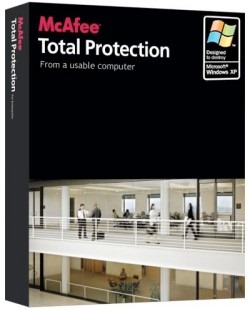“We’re hearing from all over that a bad McAfee for Windows XP update is causing computers worldwide to shut down. Apparently DAT update 5958 deletes the svchost.exe file, which then triggers a false-positive in McAfee itself and sets off a chain of uncontrolled restarts and loss of networking functionality. Yeah, wild — Twitter is basically going nuts, and McAfee’s support site appears to be down. There are some fixes floating around out there, but it may be too late — the final tally of borked PCs today may reach into the millions. We’ve already heard anecdotally that an Intel facility has been affected, as well as Dish Network call centers, and we’re sure there are going to be more reports as the day wears on.”
The story is still developing. McAfee has yanked the update and issued the first fix, but apparently the fix requires each computer to be touched individually, one computer at a time, leaving enterprise IP departments fuming as they stare at thousands of bricked PCs.
So far it appears this is only an issue for big enterprises. The faulty update apparently had only been put on the corporate update servers and had not yet been delivered to consumers.
I hate to gloat. (Well, that’s not true – I love to gloat.) It’s satisfying to see Norton and McAfee earn their poor reputations, over and over. I wrote this note to a client yesterday:
“I tell my children when it rains, it’s because God is crying because he installed Norton software on his computers.”
Friends don’t let friends install Norton or McAfee products.


Hi Bruce , I thought Microsoft Security Essentials was only for home users? Is there a paid version for small business???
I really enjoy your blog Thanks
The license for MSE says: “Use. You may install and use any number of copies of the software on your devices in your household for use by people who reside there or for use in your home-based small business.” The license doesn’t cover non-home-based small businesses.
That creates a dilemma, because Microsoft’s business offering is its Forefront line of products for enterprises – exactly the same malware detection engine but with additional complexity, separate servers, and complicated and expensive licenses. When I’ve looked at other business security products, they’ve also been expensive and way too complex for very small businesses – the kind with a single server or no onsite server at all, a handful of workstations, and no onsite IT staff.
So technically I can’t advise anyone other than home users or home-based small businesses to use MSE if they want to stay within the strict terms of the license. But there is no built-in license enforcement in MSE and very small businesses may decide to use the product notwithstanding the license restriction. In much the same way, I don’t recall the statistic but some really large percentage of the sales of Microsoft Office Home and Student is used in small offices. There are not always perfect choices in the gap between very small businesses and mid- to large-size enterprises.
What do you recommend for anti-virus protection on either XP or Vista? Any preference for anti-malware?
Pam
It’s always dangerous to generalize – different people want different things from their programs – but for home users and small businesses, I’ve been having really good luck with Microsoft Security Essentials, the new free security software that replaced Windows Live OneCare last year. It’s effective without calling attention to itself and has almost no impact on system performance. More info here: http://www.brucebnews.com/2009/09/microsoft-security-essentials-2/.
And the obligatory reminder: the malware in the wild today can bypass your security program if you are fooled into clicking an OK button on something that looks legitimate. Rules for safe computing: http://www.brucebnews.com/2010/01/computer-safety-2010/ Be careful out there!